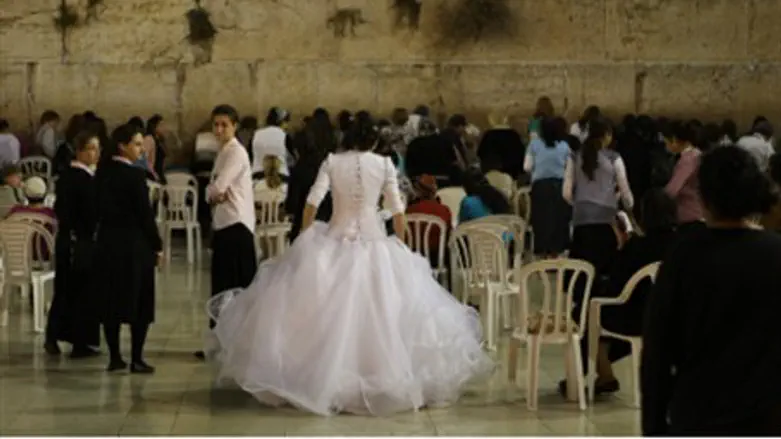
The Knesset Committee on Constitution, Law and Justice passed the second and third readings of a bill submitted by MK Yariv Levin (Likud) with other MK's that would raise the marriage age from 17 to 18 years of age. The bill had already passed preliminary readings in the 18th Knesset. Opposing the bill were MKs from United Torah Jewry and Shas, who said that raising the marriage age would have a negative impact on their communities.
Until now, Israelis were legally allowed to marry at 17 years old. However, the courts were able to authorize minors below 17 to marry, and there was, essentially, no minimum age limit. Under the new law, marriage between minors without court sanction can be criminally prosecuted, and is punishable by up to two years imprisonment.
More than just changing the minimum legal marriage age as adults, the new law now only permits the courts to give special dispensations for couples where both bride and groom are at least 16 years old. In special circumstances - such as when the bride is pregnant or given birth - the law may allow for marriages under 16 years of age. These circumstances, however, must be brought before the court after undergoing an official investigation by a social worker from the Ministry of Social Affairs and Social Services.
In addition, it was determined that an annual report will be made to the Minister of Justice, the Minister of the Interior, the Minister of Religious Services and the Minister of Public Security, Constitution, Law and Justice in matters relating to underage marriages. The reports will include the number of applications for marriages by couples under the age of 16 submitted to the court, how many of those requests received marriage permits, the total number of indictments filed, the total number of minors listed in records of the Ministry of the Interior, and other numbers to provide yearly statistics about underage marriage in Israel.
The bill was designed to prevent such young couples from making major decisions before they are mature enough to understand the legal, social, and emotional consequences of marriage, and to prevent forced marriages.
MK Moshe Gafni (United Torah Judaism) criticized the law, noting that the bill flies in the face of practices common in certain haredi communities for marriages to be conducted before the age of 18. "17 year olds can choose [to leave home, and decide] where to live. Why can't they be trusted to marry?" Gafni said. "If we would suggest such a bill, you would say that we are not being Democratic," Gafni raged. "You call us fanatics, that we can't explain anything to you, that we're hypocrites."
Other United Torah Judaism MKs described the move as "delusional", citing other recent marriage bills, like the passing of the 'Tzohar' bill into law and the recent proposals for civil marriage.
Meretz MK Zahava Gal-On praised the move, citing the fact that a lot of parents marry off their daughters at 14 and only officially register their marriage at 17. Gal-On emphasizes the importance of completing a high school education, and justifies the fact that the decision to marry is only appropriate at a later stage of development. "The Knesset has passed the law in honor of its current and former members. We have waited for this for over a decade."